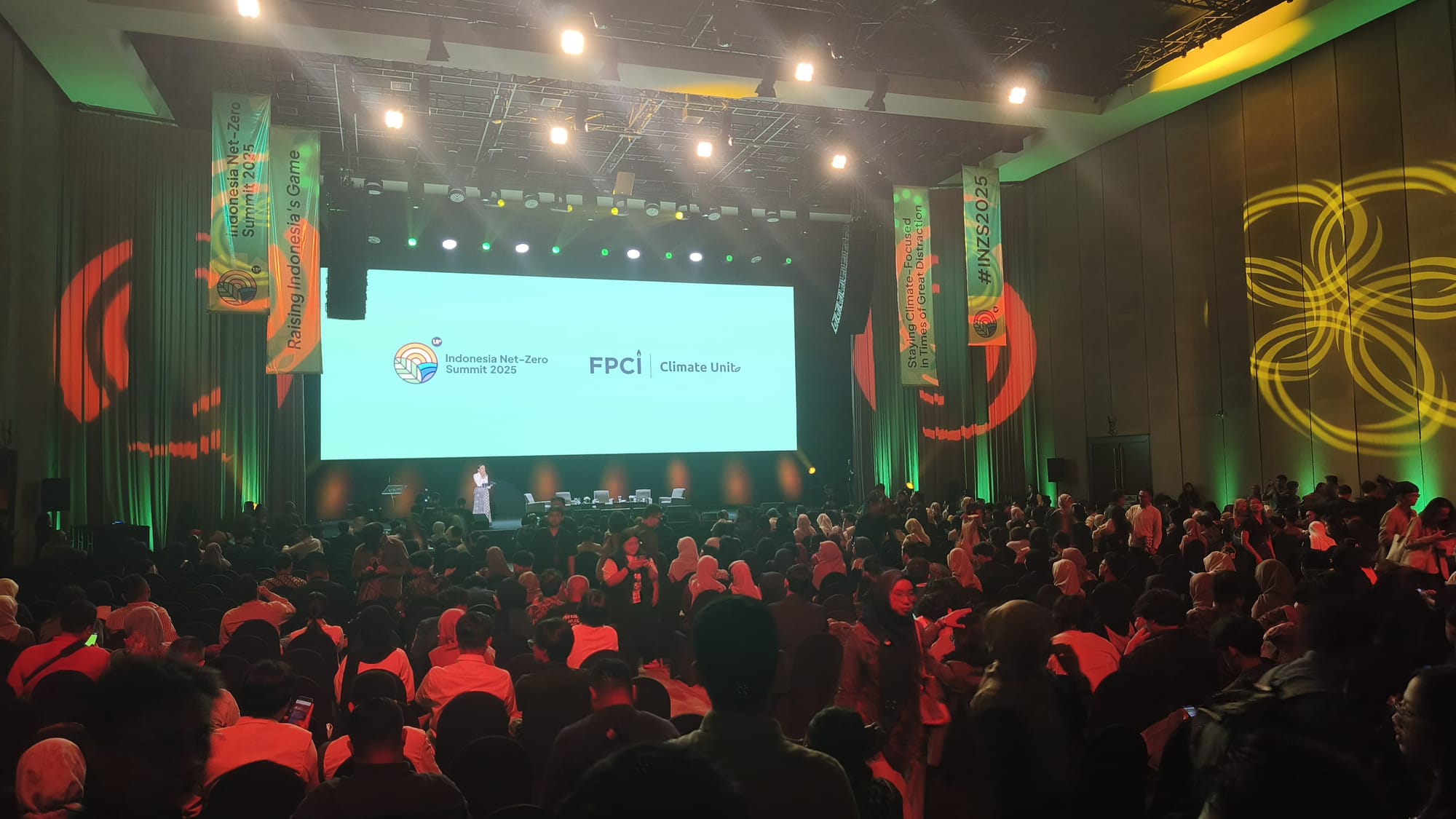Amidst the increasingly pressing climate emergency, green technology-based solutions are beginning to show their role.
This is the common thread of the panel discussion entitled “Turning Crisis into Hope: Green Technology for Climate Solutions” held by the Foreign Policy Community of Indonesia (FPCI) at the Djakarta Theater, Saturday, July 26, 2025.
Present as speakers were Expert Staff to the Minister for Social, Economic and Cultural Affairs of the Ministry of Communication and Digital Wijaya Kusumawardhana, Executive Vice Chairman and Co-Founder of Planet Carbon Ridzki Kramadibrata, Ember Senior Energy Analyst Dinita Setyawati, Artificial Intelligence Advisor FAIR Forward GIZ Indonesia Karlina Octaviany.

In the opening, senior journalist and moderator Deandra Syarizka mentioned that this discussion was designed to bring together three perspectives: the government, business actors, and think tank institutions. All three are expected to provide a cross-sectoral overview to answer the big question: to what extent can technology be a climate savior?
Wijaya, representing the government, acknowledged that the use of AI could be a driver of green growth. However, he emphasized that this potential will not be optimal without equitable digital infrastructure.
"We must have sufficient data centers and fast internet connections so that AI can work optimally," he said.
Currently, Indonesia only has around 140 data centers, while the average internet speed still lags far behind developed countries.
Another challenge is the unequal access to digital technology. Wijaya mentioned that digital transformation will only be successful if it is carried out inclusively.
"No one left behind," he said, quoting the government's main principle in technology policy.
To that end, the government is encouraging cross-sector collaboration and preparing nine AI development centers in various regions. Training programs are also designed so that people can access technology ethically and with a focus on the public interest.
On the other hand, a serious problem arises regarding the energy consumption required by the massive use of AI systems. Wijaya mentioned that the use of big data and machine learning requires enormous energy and has an impact on increasing emissions, especially if it is not supported by clean energy.
He also mentioned the risk of bias in algorithm development. "We are discussing how to build ethical AI that is not gender-biased or creates new social inequalities," said Wijaya. This principle is important so that technology remains on the side of humanity.
Another solution being developed is the involvement of the education sector. The government is assigning academic institutions to conduct AI research and will prepare supporting regulations if needed. "We cannot work alone. There must be innovation from universities and the community," he said.
Ridzki from Planet Carbon responded to that challenge with a soil-based approach: biochar. This technology uses biomass to produce charcoal that can store carbon in the soil for hundreds of years.
"Biochar is very stable," said Rizky. "It does not release carbon back into the air and can store it in the soil for 100 to 1,000 years, depending on the process." He added that biochar also reduces the need for fertilizer because it can retain water and nutrients longer in the soil.
Although promising, biochar is not without obstacles. Rizky mentioned that the biggest challenge actually arises after biochar is successfully produced in large quantities. According to him, the process of returning the material to agricultural land evenly requires a distribution system that is not simple. He added that channeling it directly to small farmers becomes difficult without a strong logistics model.
Rizky emphasized the importance of building an efficient logistics model. He encouraged collaboration with agri-tech actors to bridge this technology to the grassroots level.
Meanwhile, Dinita Setyawati, a senior analyst from the Energy Ember research institute, highlighted structural barriers in energy policy. According to her, the excessively low price of coal makes it difficult for renewable energy plants to compete.
She suggested that the government include clean flexibility tools such as pump hydro and battery storage from the project planning stage. An example is a floating solar power plant in a reservoir that can be combined with energy storage.
In addition, strengthening the electricity grid between regions is key. Dinita pointed out that regions such as Sumatra have high potential for exporting solar power to Singapore if interconnections are strengthened.
On the other hand, Dinita highlighted that Indonesia has not adopted an electricity pricing system that reflects the actual cost. The existence of hidden subsidies for coal through the domestic market obligation (DMO) policy makes renewable energy unable to compete economically.
Technology-based solutions can also be expanded into the social sphere. Karlina Oktaviani from Fair Forward GIZ Indonesia explained how AI can be developed together with local communities on the islands of Aceh and Maros.
In these two regions, Karlina and the Fair Forward team built IoT sensor-based weather stations that were assembled directly by residents. These sensors are designed to be simple, inexpensive, and able to be maintained by the community themselves. "We trained local residents for four hours to assemble the sensors and write the coding," said Karlina. Some sensors were even tested directly at sea, facing waves and natural disturbances, including being used as crab nests.
"We put the data center in a coffee shop. Because that's where residents gather, pay attention to the sensors, and take care of the equipment," said Karlina while emphasizing the importance of adapting technology to local culture.
Fair Forward also built a regional language dataset to train contextual and fair AI. All data is opened to the public, and training is structured so that it can be accessed by residents without a technical background.
"We want indigenous people to not just be research objects, but also technology managers. They must have autonomy over their own knowledge," said Karlina. This principle is the basis for developing Fair Forward technology that is inclusive and based on local needs.
This discussion illustrates that climate crisis solutions do not only come from ivory tower policies or sophisticated laboratories. Rather, a combination of digital devices, local knowledge, and structural support can produce a more tangible transformation to address climate change.






